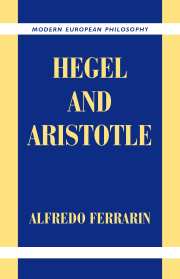Book contents
- Frontmatter
- Contents
- Acknowledgments
- List of Abbreviations
- Introduction
- PART I THE HISTORY OF PHILOSOPHY AND ITS PLACE WITHIN THE SYSTEM
- PART II LOGIC AND METAPHYSICS
- 3 The Lectures on the Metaphysics
- 4 The Aristotelian Heritage in the Science of Logic
- 5 Aristotelian Questions
- 6 Essence and Concept
- PART III ARISTOTLE AND THE REALPHILOSOPHIE
- PART IV CONCLUSIONS
- Bibliography
- Index
5 - Aristotelian Questions
Published online by Cambridge University Press: 22 October 2009
- Frontmatter
- Contents
- Acknowledgments
- List of Abbreviations
- Introduction
- PART I THE HISTORY OF PHILOSOPHY AND ITS PLACE WITHIN THE SYSTEM
- PART II LOGIC AND METAPHYSICS
- 3 The Lectures on the Metaphysics
- 4 The Aristotelian Heritage in the Science of Logic
- 5 Aristotelian Questions
- 6 Essence and Concept
- PART III ARISTOTLE AND THE REALPHILOSOPHIE
- PART IV CONCLUSIONS
- Bibliography
- Index
Summary
Intuiting essences conceals no more difficulties or “mystical” secrets than does perception.
E. Husserl, Philosophie als strenge WissenschaftSubstance and Activity
Is Hegel justified in this characterization of form as subjectivity in Aristotle? Is this interpretation of the identity of form, end, and cause of motion (Zweck, Bewegungsursache) legitimate? Certainly at first glance the order and content of the central books of the Metaphysics would seem to support such an interpretation. It would require some qualifications; but it is clear that Aristotle progressively moves from the investigation of substance to that of form or essence (Z 4), then shows how essence is cause (Z 17) and energeia, the actuality of matter (H 2). There are, however, many objections to such a reconstruction; without going into details, the general objection is that this seems to make sense mostly on the basis of a restriction of substance to natural substance, and that it becomes problematic when we speak of mathematical or artificial forms, and also of separate forms (the nous, the unmoved movers). If so, then the problem of the nature of the central books becomes pressing: are they the object of a physical investigation, that is, do they deal with the principles of sensible substances subject to movement? If they do, does any difference remain between first and second philosophy on the treatment of substance? If they do, how can anything universal about substance, not to mention about being, be argued on the basis of their conclusions?
- Type
- Chapter
- Information
- Hegel and Aristotle , pp. 149 - 180Publisher: Cambridge University PressPrint publication year: 2001



